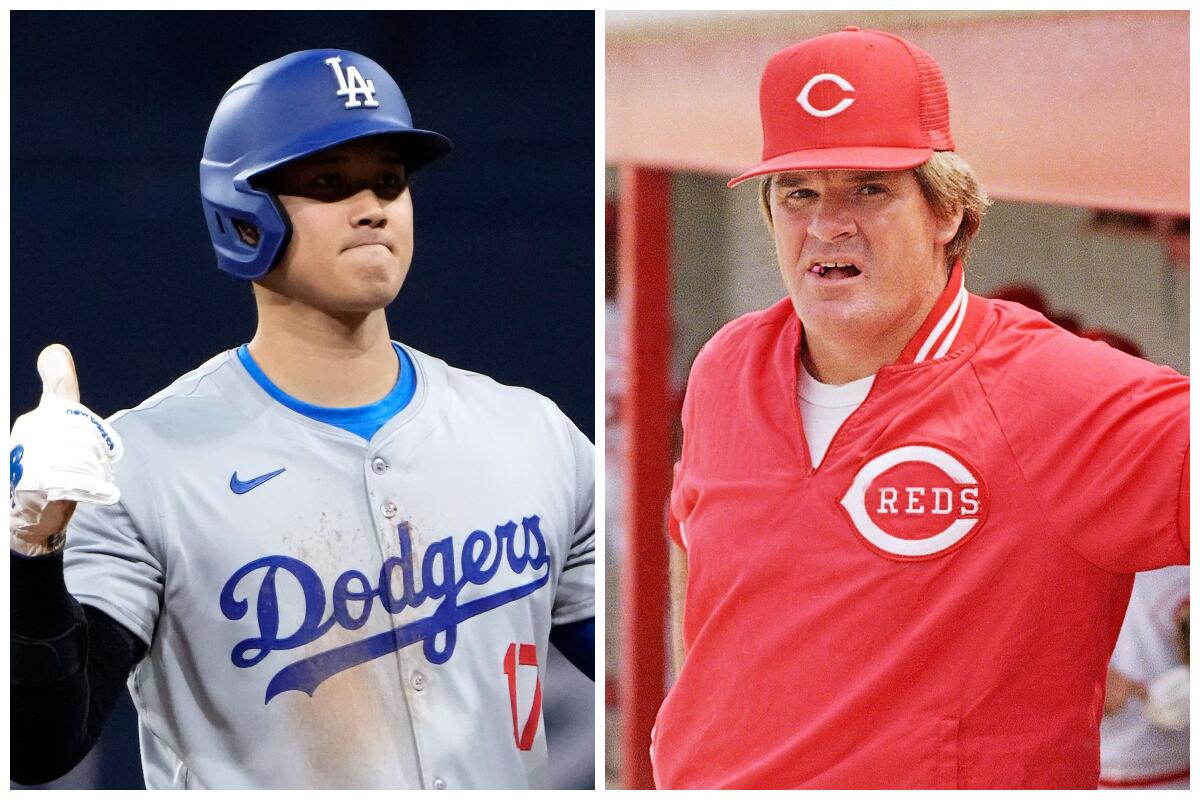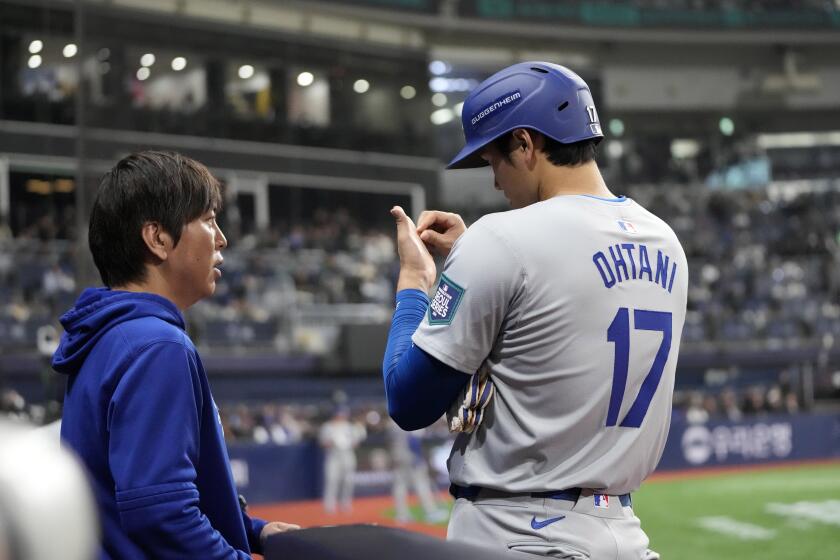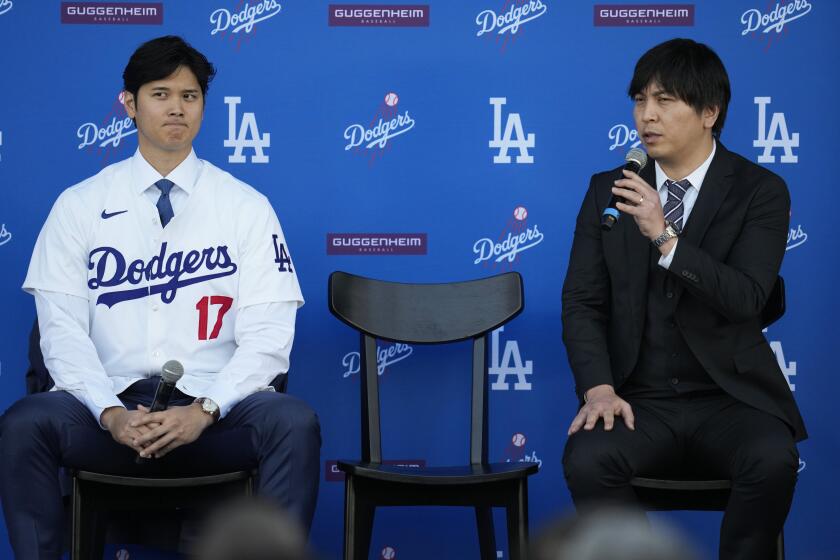Is Shohei Ohtani another Pete Rose? Dodgers star may be in legal trouble if he paid gambling debt

- Share via
Shohei Ohtani is no Pete Rose. At least not yet.
For one thing, as accomplished as Ohtani is at baseball, his career 684 hits pale in comparison with Rose’s 4,256, the most of any major league player.
More pertinent to the news cycle is that Ohtani hasn’t been accused of betting on baseball, or betting at all. Rose famously was banned from baseball for life in 1989 by then-Commissioner Bartlett Giamatti (yes, Paul’s dad), whose investigation concluded that Rose had bet on major league games as a player and as a manager.
Rose, 82, remains popular with fans, but his attempts at reinstatement have been unsuccessful. He also is barred from the Hall of Fame.
Representatives of Dodgers superstar Shohei Ohtani accused his interpreter of engaging in a ‘massive theft’ of the ballplayer’s funds to place bets with an allegedly illegal bookmaker.
Ohtani, 29, doesn’t appear to be in any such peril. However, as The Times first reported, the new Dodgers superstar was uncomfortably close to a gambling operation. His representatives accused his longtime interpreter and friend, Ippei Mizuhara, of engaging in a “massive theft” of Ohtani’s money allegedly used to pay off millions in gambling debts Mizuhara owed to a bookmaker.
Ohtani’s representatives muddied the waters by making Mizuhara available for a telephone interview Tuesday with ESPN during which Mizuhara said Ohtani paid his gambling debts by making wire transfers to a bookmaker. A day later, Ohtani’s representatives renounced Mizuhara’s account and alleged theft. The Dodgers fired Mizuhara on Wednesday.
During the interview that ESPN reported as lasting 90 minutes, Mizuhara said, “I want everyone to know Shohei had zero involvement in betting.”
Ohtani, however, might have broken the law if he paid Mizuhara’s gambling debt, according to I. Nelson Rose, a gambling law scholar and professor emeritus at Whittier College.
“If he paid the debt knowing it was for illegal gambling, there is the potential for fairly serious federal penalties,” Rose said. “There is a federal statute that says, in effect, that if you help an illegal gambling operator collect debts, you are in the business of gambling. Even if he was only doing this to help a friend, he certainly knew he was helping the bookmaker collect the debt.”
Gambling by MLB players is strictly prohibited under Rule 21, which is posted in every clubhouse in English and Spanish and acknowledged in writing every year by every player. The rule addresses all sorts of misconduct, including a player not giving his all, giving a gift to an opposing player or an umpire, and committing a violent act on another player or umpire.
Shohei Ohtani had a close bond with his longtime interpreter Ippei Mizuhara, but the interpreter has since been accused of theft and illegal gambling.
As for gambling, Rule 21 has three parts:
1) Any player, umpire, or Club or League official or employee, who shall bet any sum whatsoever upon any baseball game in connection with which the bettor has no duty to perform, shall be declared ineligible for one year.
(2) Any player, umpire, or Club or League official or employee, who shall bet any sum whatsoever upon any baseball game in connection with which the bettor has a duty to perform, shall be declared permanently ineligible.
(3) Any player, umpire, or Club or League official or employee who places bets with illegal book makers, or agents for illegal book makers, shall be subject to such penalty as the Commissioner deems appropriate in light of the facts and circumstances of the conduct. Any player, umpire, or Club or League official or employee who operates or works for an illegal bookmaking business shall be subject to a minimum of a one-year suspension by the Commissioner. For purposes of this provision, an illegal bookmaker is an individual who accepts, places or handles wagers on sporting events from members of the public as part of a gaming operation that is unlawful in the jurisdiction in which the bets are accepted.
Rule 21 was created after the Black Sox scandal of 1919, when eight Chicago White Sox players were accused of throwing the World Series in exchange for money from gamblers. In short, it was baseball’s first serious attempt at ensuring the integrity of competition.
Many within the Dodgers organization seemed startled Shohei Ohtani’s interpreter and close friend Ippei Mizuhara was accused of theft and gambling.
Banning Rose — Pete, not Nelson — for life was another marker, Giamatti sending a decisive message to anyone paying attention that games are not fixed or outcomes predetermined. Every commissioner since him has reinforced the message by declining to reinstate Rose.
For his part, Rose — again, Pete — made a snide remark about Ohtani’s situation in a video posted to social media: “Well, back in the ‘70s and ‘80s, I wish I’d have had an interpreter. I’d be scot-free.”
Gambling on sports has become legal in some form in 38 states and the District of Columbia. MLB, the NFL, the NBA and other sports have increasingly embraced its revenue potential. Sports betting remains illegal in California and public sentiment continues to be against a shift in the law.
In 2022, voters in California shot down two competing propositions that would have allowed sports gambling despite an estimated $500 million spent to promote the bills. Proponents declined to revisit the bills this year, and it’s unclear whether another effort will be made in 2026.
Advertisements for sports betting are nevertheless ubiquitous. California is not immune to the relentless marketing from sports betting giants FanDuel and DraftKings, and Las Vegas is a short drive or flight away.
But California residents who wish to place large bets on sporting events from home do so illegally, either online or with a bookmaker. Mizuhara allegedly placed bets with Mathew Bowyer, a San Juan Capistrano resident whose home was raided by federal agents last year as part of an investigation.
Shohei Ohtani won’t tell his story. So his story and his public image are now in the custody of people who hope this story will simply vanish. It won’t.
Ronald Peters, a bar owner in Franklin, Ohio, was Rose’s bookie. He was a primary witness in the 1989 investigation by baseball investigator John Dowd that led to Rose accepting a lifetime ban, telling Dowd that he took more than $1 million in bets from Rose.
Peters died alone in his apartment in 2016 and received an indigent cremation.
More to Read
Go beyond the scoreboard
Get the latest on L.A.'s teams in the daily Sports Report newsletter.
You may occasionally receive promotional content from the Los Angeles Times.
















